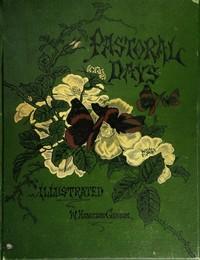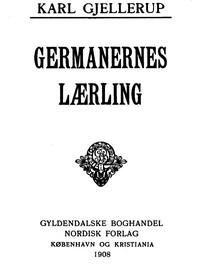Read this ebook for free! No credit card needed, absolutely nothing to pay.
Words: 78082 in 26 pages
This is an ebook sharing website. You can read the uploaded ebooks for free here. No credit cards needed, nothing to pay. If you want to own a digital copy of the ebook, or want to read offline with your favorite ebook-reader, then you can choose to buy and download the ebook.
over, and he came back home, she took it up again. He left the town where he had been reared and moved to Richmond, and then after a time from Richmond to Baltimore; in due season she followed after. Finally he had moved to this more westerly city, lying on the border between the North and the South. And now here she was too.
Through an agent in Virginia she had leased, ready furnished, the old Gresham place, diagonally across the way from the front entrance of the Gaunt House; that fact speedily came out, proving that, like him, she also had means of her own. Through this same agent the taxes were thereafter paid. Presumably she moved in under cover of night, for she was a figure that, once seen, was not to be forgotten; and most certainly no one could remember having seen her before that fine spring morning when Major Foxmaster came out of the Gaunt House to find her waiting for him.
She had brought her servants with her--a middle-aged mulatto man and his wife, a tall, young, coal-black negro woman; both of them as close-mouthed as only some negroes can be, when they are the exceptions to prove the rule of a garrulous race. The mulatto man was a combination of butler and gardener. It was he who did the marketing, dealing with the tradespeople and paying all the bills. The negro woman was the cook, presumably. Passers-by rarely saw her. These two, with their mistress, composed the household.
For such a mistress and such a household the old Gresham place made a most fit abiding place. It was one of those houses that seemed builded for the breeding of mysteries and the harbouring of tragedies--the kind of house that cannot stand vacant long without vaguely acquiring the reputation of being haunted. It was a big, foursquare house of greyish stone, placed in the exact centre of a narrow, treeless lot, which extended through for the full depth of the city block. In front of it was a high picketed fence and a deep, bare grassplot; behind it was a garden of sorts, with a few stunted and illy-nourished berry bushes; and on each side of it was a brick wall, so high that the sunshine never fell on the earth at the side of the house toward the north; and even in the hottest summer weather the foundation stones there were slick and sweaty with the damp, and big snails crawled on the brick wall that ran in the shadow of the wall, leaving trails of a luminous slime across the slick greenish mould which covered the bricks.
The woman took this house, with its gear and garnishings, just as the last of the Greshams had left it when he died. During the months and years it remained tenantless all the upper windows had been tightly shuttered; she left them so. In the two lower front windows, which flanked the deeply recessed front door and which lacked blinds, were stiff, heavy shades of a dull silver colour, drawn down until only a glassed space of inches showed between their unfringed ends and the stone copings. These, too, were left as they had been. They accorded well with the blank, cold house itself; they matched in with its drear old face; they made you think of coins on a dead man's eyes.
This house, as I have said, stood almost opposite the Gaunt House. What went on within it no outsider ever knew, for no outsider ever crossed its threshold--to this good day no outsider ever has known; but every day its door opened to let out its draped and veiled mistress, setting forth on her business, which was to follow Major Foxmaster; and every night, when that day's business was done, it opened again to let her back in. In time the town grew used to the sight; it never grew tired of talking about it.
As for Major Foxmaster, he would dodge about the country no more; for, in the long run or the short, dodging availed him nothing. The years behind him proved that. He would bide where he was until death, which was the supreme handicapper, named the winner of this, the last heat of their strange match. He would outlive her and be free; else she would outlive him, to see her long-famished hatred sated. And he wondered whether, if he died first, she, in her black mourning, would dog his dead body to the grave as she had dogged his living steps! It was a morbid fancy and, perhaps because it was morbid, it found a lodgment in the Major's mind, recurring to him again and again. The existence that he--and she--had willed him to lead was not conducive to an entirely healthy mental aspect.
Whatever his thoughts were, he betrayed none of them to the rest of creation. Exactly as before she appeared, so he continued to deport himself. His behaviour showed no change. He took his walks, drove his bay filly, played his cards at the Kenilworth. He carried his head as high as ever; he snapped his military heels down as firmly as ever on the stones of the street and the bricks of the sidewalk. With a pair of eyes that were as inscrutable and yet as clear as two bits of hard blue ice, and with a face like a square of chipped flint, he went his daily and his hourly way, outwardly oblivious to the stares of acquaintance and stranger alike, seeming not to know that ten paces in his rear, or twelve, came drifting this erect veiled shape which was clad all in dead black--as black as sin, as black as his sin had been, as black as her misery had been--the incarnate embodiment of her shame and his.
In fair weather as in foul, in blistering midsummer and blizzardy midwinter, daytime and nighttime, she followed him. If she lost the trail she waited in all patience until he reappeared. She seemed tireless and hungerless. Wet or cold or heat seemed not to affect her. In her grim pursuit of him her spirit rose triumphant above the calls of the flesh. At midnight, after a long vigil outside the Kenilworth, she moved behind him with the same swift, noiseless, floating motion that marked her in the morning. And so it went with these two.
If he did not notice her presence, neither did he seek ever to elude her. If he never spoke to her, neither did he speak of her to others. As for the woman, she never spoke to any one at all. Outside the walls of the house where she lived her voice was never heard and her face was never seen. Only one person ever dared speak to the Major of her.
Old Sherwan himself did not dare. Of all human beings he stood nearest to the Major. If the Major might be said to have an intimate Judge Sherwan was the one. Moreover, he, Sherwan, was by way of being a he-gossip, which of all the created breeds of gossips is the most persistent and the most consistent, the most prying and, therefore, the most dangerous. He yearned for the smell of impropriety as a drug-fiend yearns for his drug. His was a brackish old soul and from its soured depths he dearly loved to spew up the bilge waters of scandal. The pumps leading to that fouled hold were always in good order. Give him the inch of fact and he would guarantee to provide the ell of surmise and innuendo. Grown too old to sin actually he craved to sin vicariously--to balance always on the edge of indiscretion, since he no longer plunged into it bodily.
Wherefore, after the woman came and the first shock of her coming wore off, he made a point of being seen in Major Foxmaster's company as much as possible. The share of notoriety the association brought him was dear to his withered, slack-valved old heart. In his manner and his look, in the very way he cocked his hat and waggled his stiffened legs, you discerned that he wished to divide with his friend the responsibility for the presence of his friend's trailing shadow.
Free books android app tbrJar TBR JAR Read Free books online gutenberg
More posts by @FreeBooks

: Pastoral Days; or Memories of a New England Year by Gibson W Hamilton William Hamilton - Natural history Outdoor books; Natural history New England










